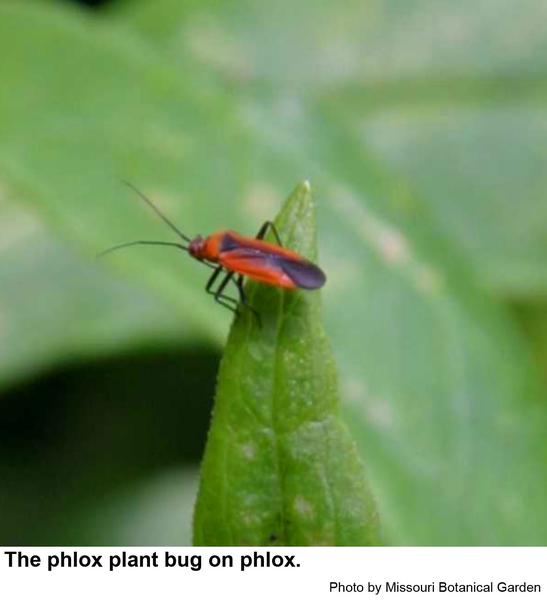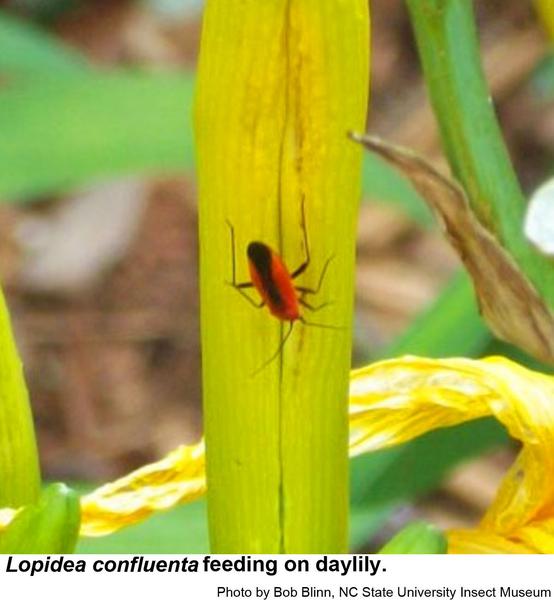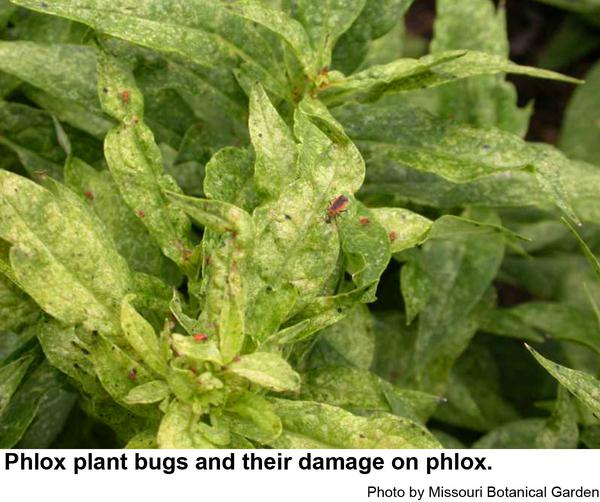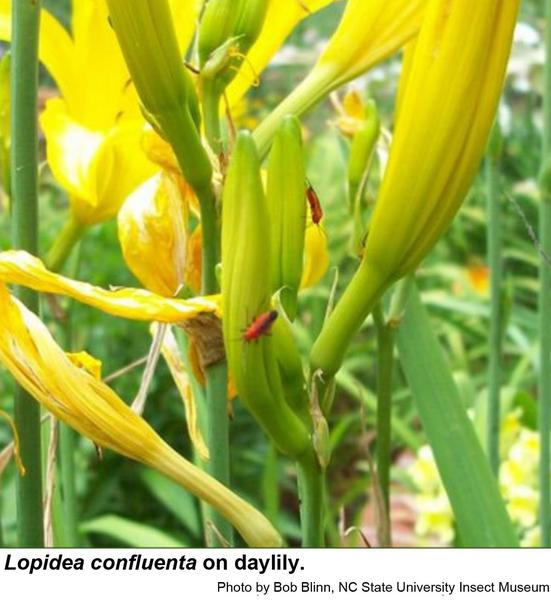Description and Biology
The phlox plant bug, Lopidea davisi, is a small, relatively slender insect (about three times longer than wide) that is pink to red with a black line or band down the back that is wider at the rear. Other bugs in this genus are sometimes referred to as lopidea plant bugs and even scarlet plant bugs (even though some species are yellowish, orange, or even brown). We have about a dozen species of Lopidea in North Carolina. Phlox bugs lay their eggs in phlox stems and overwinter as eggs in dead phlox stems. From the eggs hatch tiny nymphs that are orange with no black markings. Nymphs cluster in groups for at least part of their development. They molt and grow through five nymphal stages before adults emerge from the last molt. Bugs do not have chewing mouthparts. They feed by inserting thread-like stylets into plants, injecting saliva, and sucking out plant juice. They feed on leaves, stem tips, flowers and seeds. Phlox plant bugs sometimes "hide" on the lower surface of leaves. We have two generations per year. The first generation appears in late spring, the second in mid to late summer.
Host Plants
Each species of lopidea plant bugs tend to feed on a very limited number of kinds of host plants although Lopidea heidemanni, the most common lopidea plant bug collected in North Carolina, has been collected on alfalfa, locust, rose, and a wide variety of other herbaceous plants. The phlox plant bug can cause considerable damage to phlox (the only host listed for this species). Lopidea confluenta has been collected from daylilies and iris where it sometimes seems to cause little damage although it has been reported to cause daylily and iris flower buds to shrivel and abort. Lopidea robiniae has been collected from black locust in June and July. Lopidea plant bugs have also been collected on goldenrod and reported from passionflower.
Residential Recommendations
A number of agricultural chemicals are labeled for plant bug control on ornamental plants, but most should not be applied when plants are in bloom to avoid killing pollinators. If these bugs are causing damage significant enough to merit control, insecticidal soap or a horticultural oil may be used as they cause less damage to pollinators. Gathering and destroying dead phlox haulms during the winter should reduce phlox plant bug numbers the following spring.
Other Resources
- An Annotated List of the Miridae of Georgia (Hemiptera-Heteroptera). Henry, T. J. and C. L. Smith. 1979. Journal of the Georgia Entomological Society 14: 212 to 220.
- Genus Lopidea. McLeod, R. et al. 2016 (update). Bugguide, Iowa State University Department of Entomology.
- Lopidea Confluenta. Anonymous. 2012 (Copyright). Daylilies, The AHS Daylily Dictionary.
- Phlox Bugs. Anonymous. No Date. Missouri Botanical Garden.
- Scarlet Plant Bug - Lopidea. Elliott, L. 2008. BugGuide, Iowa State University Department of Entomology.
- Species Lopidea marginata. Parker, H. S. 2009. BugGuide, Iowa State University Department of Entomology.
- NC State Extension Plant Pathology Publications
- NC State Horticultural Science Publications
- North Carolina Agricultural Chemicals Manual
For assistance with a specific problem, contact your local Cooperative Extension center.
This factsheet has not been peer reviewed.
Publication date: April 23, 2020
Reviewed/Revised: March 6, 2025
Recommendations for the use of agricultural chemicals are included in this publication as a convenience to the reader. The use of brand names and any mention or listing of commercial products or services in this publication does not imply endorsement by NC State University or N.C. A&T State University nor discrimination against similar products or services not mentioned. Individuals who use agricultural chemicals are responsible for ensuring that the intended use complies with current regulations and conforms to the product label. Be sure to obtain current information about usage regulations and examine a current product label before applying any chemical. For assistance, contact your local N.C. Cooperative Extension county center.
N.C. Cooperative Extension prohibits discrimination and harassment regardless of age, color, disability, family and marital status, gender identity, national origin, political beliefs, race, religion, sex (including pregnancy), sexual orientation and veteran status.




